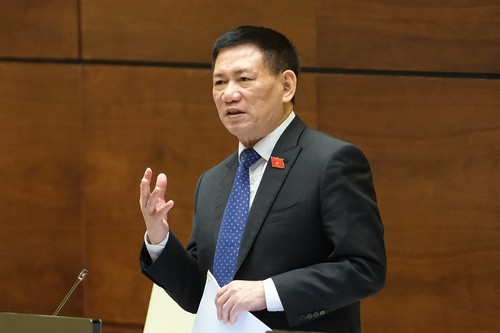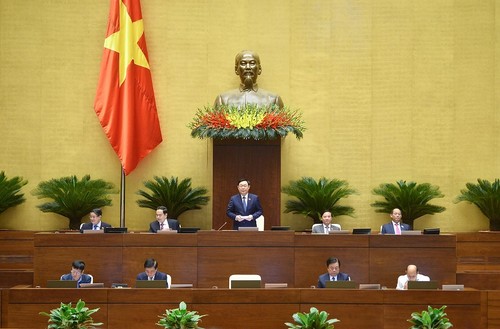 Minister of Finance Ho Duc Phoc at the Q&A session (Photo: quochoi.vn) Minister of Finance Ho Duc Phoc at the Q&A session (Photo: quochoi.vn) |
Mr. Phoc said it’s still possible to keep inflation below 4% for the year, the target set by the National Assembly.
But fluctuating energy and strategic material prices in the world market continue to put pressure on domestic prices. That and adjusting public service prices to the market will have a great impact on the inflation control target for 2022.
“Inflation is a widespread problem. The US has an inflation rate of 8.3%, the EU 8%, and Thailand 4.6%. Vietnam’s current rate is 2.25%. As Vietnam's economy integrates into the world economy, rising raw material prices abroad will impact prices in Vietnam. But its advantage of food self-sufficiency means inflation will affect Vietnam less,” said Phoc, adding, “In order to control inflation, it’s necessary to take money out of circulation, reduce recurring costs, control prices, comply with price controls, and promote business growth.”
Governor of the State Bank Nguyen Thi Hong says that from now until the end of this year, monetary policy must closely follow the disbursement of economic recovery packages.
 NA Chairman Vuong Dinh Hue chairs the Q&A session on financial issues. (Photo: quochoi.vn) NA Chairman Vuong Dinh Hue chairs the Q&A session on financial issues. (Photo: quochoi.vn) |
Mr. Phoc said more attention should be paid to combining monetary and fiscal policy with price controls.
“The Ministry of Finance will soon submit to the government an amended Decree 153 on private offering and trading of corporate bonds in the domestic market and offering of corporate bonds in the international market which will focus on identifying professional securities investors, monitoring investments by individual investors, monitoring bond allocation methods to avoid selling to the wrong investors, requesting credit ratings, strengthening responsibility, and taking steps to manage intermediary organizations,” Mr. Phoc explained.
He said, “The Ministry of Finance plans to review the Law on Securities and the Law on Enterprises and submit them to the National Assembly for amendment.”
At the Q&A session, Mr. Phoc answered questions about equitization and divestment of the state capital in enterprises, procurement of public assets, and tax management on donated cars.